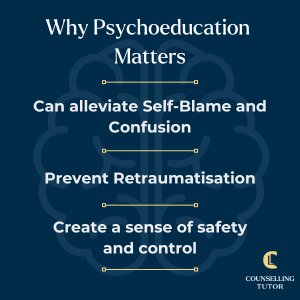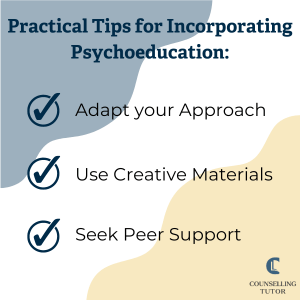The Importance of Psychoeducation in Trauma-Informed Practice
Psychoeducation has become increasingly recognised as a vital component in trauma-informed therapeutic practices, mainly when working with survivors of childhood sexual abuse (CSA).
Despite its crucial role, traditional models of therapy have historically minimised or avoided the inclusion of psychoeducative material. This trend has shifted as practitioners understand how psychoeducation can empower clients by helping them comprehend and contextualise their experiences, reactions, and symptoms.

Historically, psychoeducation was minimised in therapy due to a focus on non-directive approaches and the belief that clients should discover insights independently. However, as research into trauma and its impact on the brain has advanced, counsellors and psychotherapists have increasingly recognised that providing clients with information about their psychological processes can be crucial for healing.
This shift reflects a growing understanding of the importance of psychoeducation in helping clients make sense of their experiences and symptoms, thereby facilitating deeper therapeutic engagement and recovery.
Learning Outcomes
- Understanding Psychoeducation: Grasp the concept of psychoeducation and its relevance in trauma-informed therapy, especially in alleviating self-blame and promoting healing.
- Application in Practice: Learn how to integrate psychoeducative materials and approaches into therapy, particularly when working with survivors of abuse, to enhance therapeutic outcomes.
- Enhancing Therapeutic Communication: Develop skills to communicate complex psychological processes in a way that is accessible and validating for clients.
Integrating Psychoeducation into Therapeutic Practice
Why Psychoeducation Matters
Psychoeducation serves as a foundational element in trauma-informed practice, particularly for clients who have endured traumatic experiences such as CSA. It involves educating clients about how their minds and bodies respond to trauma, which can be incredibly empowering and alleviating for those burdened by self-blame and confusion. For instance, explaining the neurobiological responses to trauma—such as the “freeze” response—can help clients understand that their reactions were beyond their control and not indicative of personal failure.

Moreover, psychoeducation plays a critical role in preventing re-traumatisation. By helping clients identify and understand their triggers, therapists can equip them with strategies to manage and mitigate these responses. This proactive approach creates a sense of safety and control, crucial components of the healing process.
Case Studies: Applying Psychoeducation
Here are two example case studies to illustrate the practical application, and importance, of psychoeducation in therapy:
Jenny’s Story
Jenny, a survivor of sexual assault, struggles with intense self-blame for freezing during the attack. Through psychoeducation, her therapist explains the brain’s automatic response to trauma, emphasising that freezing is a common, uncontrollable survival mechanism. This explanation significantly reduces Jenny’s self-blame, highlighting the transformative power of psychoeducation in therapy.
David’s Story
David carries guilt for complying with an abuser’s demands in a futile attempt to protect his younger brother. The therapist clarifies that the abuser’s manipulation was a strategy to exert control and that David’s actions were those of a frightened child, not a responsible adult. This revelation helps David to release the misplaced guilt, demonstrating the importance of psychoeducation and providing clients with accurate information about the dynamics of abuse.
Challenges and Considerations
Counsellors and psychotherapists must navigate the delicate balance between providing necessary information and overwhelming the client with too much detail. The therapist’s role is not to impose knowledge but to offer it as a tool for understanding and healing. This requires sensitivity to the client’s readiness and the appropriateness of the information shared.
Ethical considerations are also crucial when integrating psychoeducation. Practitioners must ensure that the information provided is accurate, evidence-based, and delivered in a way that respects the client’s autonomy. Overloading a client with information can increase anxiety or confusion, so it’s essential to pace the delivery according to the client’s needs and capacity.
Practical Tips for Therapists
- Adapt Your Approach: Consider how your therapeutic contract and approach might need to change to incorporate psychoeducation effectively. In your initial agreement, this might involve explicitly stating that you will offer relevant information to help clients understand their experiences.

- Use Creative Materials: Visual aids or simple diagrams can help explain complex psychological processes, especially for clients who struggle with abstract concepts. For example, a simple diagram of the brain’s response to trauma can be a powerful tool for explaining the “freeze” response.
- Seek Peer Support: Regularly discuss your psychoeducative approaches with colleagues or supervisors to refine your methods and ensure they are effective and ethically sound. Peer discussions can also provide new insights and techniques for effectively delivering psychoeducation.
Next Steps in Your Professional Practice
- Integrate Psychoeducation: Start incorporating psychoeducative materials and discussions into your sessions. Begin with simple explanations of trauma responses and gradually introduce more complex concepts as your clients become comfortable.
- Reflect on Your Practice: Consider how psychoeducation could be better integrated into your therapeutic approach. Reflect on recent sessions where psychoeducation could have been useful and plan how you might approach similar situations.
- Engage in Peer Discussions: Schedule time with colleagues or your supervisor to discuss how they use psychoeducation in their practice. Share your experiences and gather new ideas or approaches that you can try.
- Further Training: Look into workshops or courses focusing on trauma-informed care and psychoeducation. Expanding your knowledge and skills in this area can enhance your therapeutic effectiveness.
Final Remarks
The integration of psychoeducation into trauma-informed practice is not just an additional tool but a crucial component that can significantly enhance therapeutic outcomes.
By helping clients understand the psychological and physiological processes that underpin their experiences, therapists can alleviate self-blame, reduce feelings of abnormality, and empower clients to engage more fully in their healing journey.
As therapists, we must continually refine our use of psychoeducation in our practice to sensitively and effectively meet our client’s needs.
References and Further Reading
Sanderson, C. (1990). Counselling Adult Survivors of Child Sexual Abuse. London: Jessica Kingsley Publishers.
Anna Freud National Centre for Children and Families. (2022). Psychoeducation: What it is and how it helps. Retrieved from https://www.annafreud.org